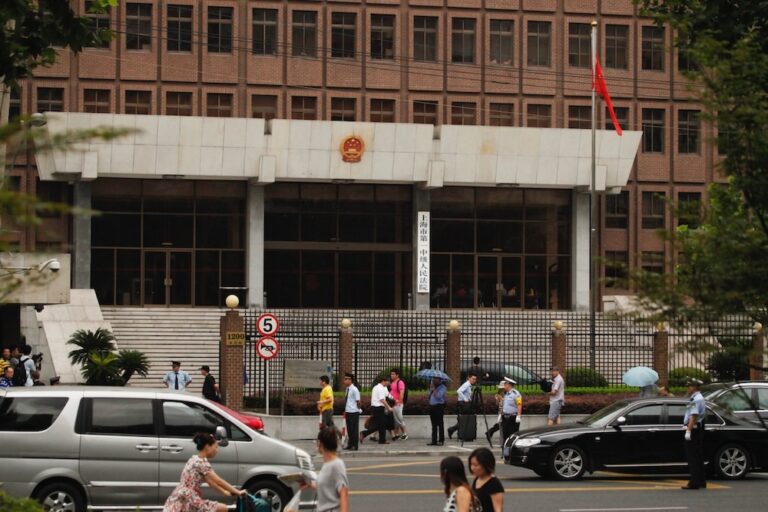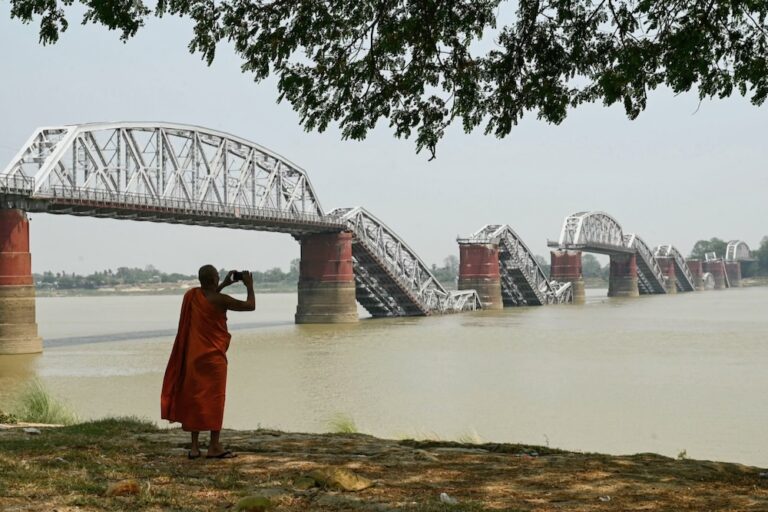October in Asia-Pacific: A roundup of key free expression news, based on IFEX member reports
Protests turn violent while China censors solidarity
Protests in Hong Kong show no sign of abating, as activists press for urgent reforms amid calls to investigate the police for using excessive force in dealing with the participants of the mass actions. Even journalists have been violently attacked and detained, impeding their work and affecting coverage of the protests.
Veby Mega Indah, an Indonesian journalist, could become permanently blind after she was shot in the face with a police projectile.
Authorities revived a colonial-era law to ban the use of facial covering during protests. Activists have been defying this regulation, while journalists continue to engage authorities about how policies like this can undermine press freedom. Another recent proposal rejected by media groups is the establishment of a centralized system for identifying journalists, which could potentially lead to intensified surveillance, privacy violations, and arbitrary use of rules to intimidate critical reporters.
Mainland China authorities continue to dismiss the Hong Kong rallies as violent riots while clamping down on individuals and groups expressing support for them. Freelance journalist Sophia Huang Xueqin, who covered the Hong Kong protest, was arrested in Guangzhou for “making trouble and picking quarrels”. A state-backed information campaign targeted the North America-based National Basketball Association executives for initially declaring solidarity to Hong Kong protesters. Gamers were suspended and harassed for making the same stand. Popular Chinese app TikTok is also reportedly censoring keywords related to the protest movement.
Kashmir back to normal?
Landlines, SMS, and call services in Kashmir were partially restored two months after a communications blackout was imposed by the Indian government. Internet connections remain suspended and postpaid services are intermittently restricted.
Indian authorities claim that the situation is returning to normal in the region, but this is disputed by media and human rights groups. A statement was signed by global civil society groups highlighting the humanitarian impact of the political crackdown and urging the government “to defend the civil and political rights of Kashmiri people by restoring Articles 370 and 35A of the Constitution of India, protect their freedom of expression, right to information, right to peaceful assembly and other political rights and economic rights.”
As the situation continues to deteriorate, Kashmiri residents have reportedly organized various peaceful actions to call for the restoration of services. Women and journalists staged protests against the communications blackout, while state security forces operations intensified.
Meanwhile, a study by the Committee to Protect Journalists (CPJ) shows how the Indian government is censoring Kashmiri journalism and highlights the role of social media companies like Twitter in restricting access to information.
Addressing the Wiki gender gap and combatting online abuse
In Pakistan, IFEX members Digital Rights Foundation (DRF) and Media Matters for Democracy (MMfD) teamed up with the Embassy of Sweden and United Nations Women to organize the first Wiki Gender Gap Editathon, which aims to add Wikipedia entries regarding Pakistani women, feminist issues and history. Volunteers were able to produce 50+ articles highlighting the role of Pakistani women in society.
In Australia, Gender Equity Victoria and IFEX member the Media, Entertainment & Arts Alliance (MEAA) have published a report showing that while more than a third of women journalists have experienced online harassment, trolling and stalking during the course of their work, only 16% said they were aware of their workplace having existing policies to address online abuse. The report recommends “a whole-of-organisation approach to address systemic and structural sexism in the workplace.” It also asks media organizations to provide specific support for freelance journalists who are vulnerable to online attacks.
In South Korea, the death of K-pop singer and actress Sulli has sparked discussion about mental health, cyberbullying, and harassment against women who challenge cultural norms on sexuality and feminism. Sulli was cyberbullied for her non-traditional views on how women should behave in mainstream society. Her death has prompted the entertainment sector to do more to address online violence directed against women artists.
India court orders global takedown of illegal content
A ruling by the High Court of Delhi can set a new precedent with far-reaching implications for free speech. It affirmed the position that Indian courts can issue global take down orders to internet companies for illegal content published by users. IFEX member SFLC.in expressed its concern over the ruling: “We believe that ordering intermediary platforms to take down content globally negatively impacts freedom of expression online, as different countries have different standards of speech. Such orders require intermediary platforms to rely on automated filters and scan each uploaded content to check for its legality, which severely undermines the privacy of Internet users throughout the word.”
Australia’s ‘Right to Know’ campaign
Media groups in Australia including MEAA have united around an unprecedented campaign for reforms to protect media freedom, whistleblowers and the public’s right to know. On 21 October, Australian newspapers ran similar stories and redacted front pages in response to the government’s secrecy laws. According to Australia’s Right to Know coalition, there are around 75 laws related to secrecy, encryption, and spying which are often used to intimidate, prosecute, and arrest journalists. The campaign’s demands include a call for public sector whistle-blower protection, enactment of a “properly functioning” freedom of information regime, and the right to contest the application for warrants for journalists and media organizations.
In brief
A viral hashtag about a royal motorcade in Thailand saw rare online criticism of the monarchy. A few days later, the government arrested an activist for insulting the monarchy, but authorities claimed that it had nothing to do with the online comments about the motorcade. However, the arrest created fear that those who used the viral hashtag might also be targeted.
A student of Bangladesh University of Engineering and Technology was killed by suspected youth members of the ruling party which sparked protests in the country. More stories of abuse inside schools were shared online, but the webpage containing these complaints was blocked by the Bangladesh Telecommunication Regulatory Commission.
A judge in a Philippine Pasig court ruled that the “undue haste in the transmittal of records” by the prosecutor violated the right to due process of Rappler executives who are accused of violating the country’s Securities Regulation Code. The criminal case is now subject for reinvestigation, but Rappler executives continue to face other charges which media groups describe as politically-motivated.
A temporary shut down order was issued by the Maldives government against the Maldivian Democracy Network for a 2015 report that allegedly ‘insulted’ religion. Human Rights Watch urged authorities “to stop pressuring civil society organizations to censor themselves and […] demonstrate their commitment to freedom of expression.”
A judge in Cambodia ordered authorities to continue investigating espionage charges against former Radio Free Asia journalists Yeang Sothearin and Uon Chhin. Civil society groups say the ruling points to a “complete lack of evidence in support of the baseless charges” filed against the two.
Two singers in Nepal were arrested for “promoting vulgarity” in their songs. IFEX member Freedom Forum condemned the arrest of rapper Samir Ghising – who is popularly known as VTEN – and singer Durgesh Thapa as a restriction of artistic expression.
And finally, CPJ Asia program coordinator Steven Butler, who was scheduled to speak at the Asma Jahangir human rights conference, was refused entry into Pakistan after his name appeared “on a stop list of the Interior Ministry.” CPJ’s executive director Joel Simon described the decision by Pakistani authorities as “a slap in the face to those concerned about press freedom in the country.”
If you enjoyed this, check out all the October regional roundups!



